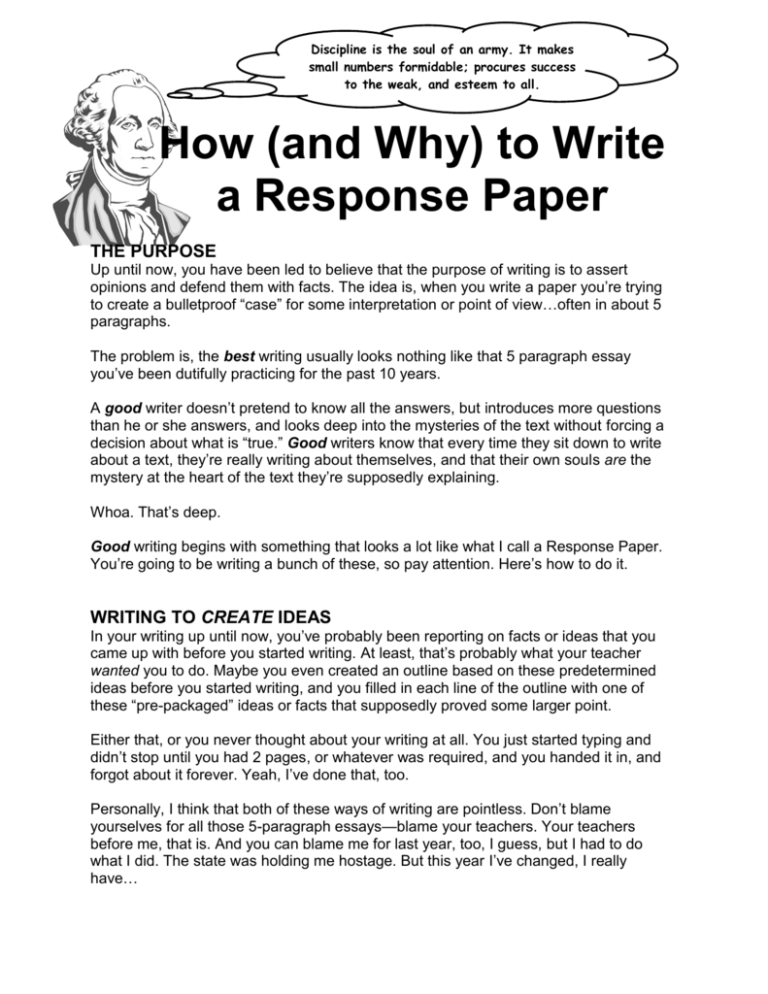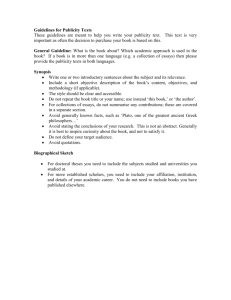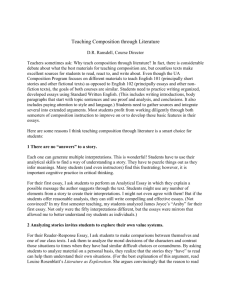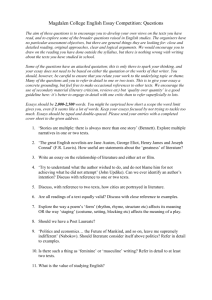How to write a response paper
advertisement

Discipline is the soul of an army. It makes small numbers formidable; procures success to the weak, and esteem to all. How (and Why) to Write a Response Paper THE PURPOSE Up until now, you have been led to believe that the purpose of writing is to assert opinions and defend them with facts. The idea is, when you write a paper you’re trying to create a bulletproof “case” for some interpretation or point of view…often in about 5 paragraphs. The problem is, the best writing usually looks nothing like that 5 paragraph essay you’ve been dutifully practicing for the past 10 years. A good writer doesn’t pretend to know all the answers, but introduces more questions than he or she answers, and looks deep into the mysteries of the text without forcing a decision about what is “true.” Good writers know that every time they sit down to write about a text, they’re really writing about themselves, and that their own souls are the mystery at the heart of the text they’re supposedly explaining. Whoa. That’s deep. Good writing begins with something that looks a lot like what I call a Response Paper. You’re going to be writing a bunch of these, so pay attention. Here’s how to do it. WRITING TO CREATE IDEAS In your writing up until now, you’ve probably been reporting on facts or ideas that you came up with before you started writing. At least, that’s probably what your teacher wanted you to do. Maybe you even created an outline based on these predetermined ideas before you started writing, and you filled in each line of the outline with one of these “pre-packaged” ideas or facts that supposedly proved some larger point. Either that, or you never thought about your writing at all. You just started typing and didn’t stop until you had 2 pages, or whatever was required, and you handed it in, and forgot about it forever. Yeah, I’ve done that, too. Personally, I think that both of these ways of writing are pointless. Don’t blame yourselves for all those 5-paragraph essays—blame your teachers. Your teachers before me, that is. And you can blame me for last year, too, I guess, but I had to do what I did. The state was holding me hostage. But this year I’ve changed, I really have… The point is, the reason people write is not really to report the great ideas they’ve been having, but rather to actually generate or create new ideas while they write! Whee! When you write a response paper in this class, you won’t start out with an outline, and you won’t have a clear idea exactly where you’re going with it until you get there. During this semester, we’ll probably start each writing assignment with some basic ideas in mind, but we’ll also focus on keeping wide open minds that will go wherever the text-and the questions we have about the text—try to take us. IDEAS TO GET YOU STARTED Okay, that all sounds nice, but what the heck are we supposed to write about? Well, the best answer is, you should write about whatever you feel like—and then you should relate it back to what we’re reading and discussing in class. Here are the three main tools you have to get you started writing each week: The texts: Each week we’ll spend 2-3 days in class doing nothing more than reading and discussing various amazing 19th-century American texts. These texts will include poetry, novels, essays, letters, and short stories. Your only job during these reading and discussion sessions will be to collect bits and pieces of text that interest and/or confuse you—bits of text you think hold more truth or meaning than we’re getting at in class. They should be quotes that you find beautiful or wise. Quotes that tell you something about yourself or make you examine your own life are especially nice to write about. After all, almost everybody can write endlessly about themselves. So don’t forget: For at least half of each week, you are a Text Collector! Questions: Got text? Well, then, all you need to start writing is a question. As we read and discuss the texts each week, we’ll come up with lots of questions. As most of you know, I am a question generating machine, and I expect you to join in and create questions of your own. For your benefit, I’ll keep a running tally of the questions we discuss each week on the board and on my blog. If you’re ever stuck and have no idea what to write, look at the questions that have come up in class and try to match some quotes you’ve collected with one of the questions we’ve been asking. One of your quotes may just unlock one of the mysteries we couldn’t “figure out” in class. Unlocking mysteries in texts is a sure path to an A in this class. Your life: That’s right, your life holds the possible answers to the questions we’re asking about the texts. If we ask about a character in a book, “How could anyone do something like this?” answer the question about yourself or someone you know. Tell specific details about what happened, and then push deeper to explain how people felt, and why they did what they did. Use writing to examine your experiences more deeply than you have before. What if you’re still stuck? Try one of these basic “outlines”: Summarize (describe what happened in the story; explain an idea in your own words) an event or philosophical concept we read about; summarize something in your own life; describe how they relate to each other. Start by describing some specific detail or event that stuck in your mind from the week’s reading. Then try to figure out WHY you like it—what about the style or content interested you and WHY? Do “literary criticism”: Choose a specific angle from which to interpret the text. If you don’t know what I’m talking about, don’t worry. In class, we’ll discuss the basics of the following types of criticism: Formalism, feminism, Marxism, mythological, biographic, and ethical/moral criticism. THE STRUCTURE I’ll draw some pictures to show you just how the structure of a response paper differs from other essays you’ve been writing. Here’s what a “good” 5paragraph essay looks like: Summarize the point you’ll “prove” and the “evidence” that backs it up Here’s what a response paper looks like: Lots of questions Minor “evidence” to support your point Get more specific: describe an example from the book Get more specific: describe an example from the book Slightly more substantial “evidence” Get personal: describe something you know or have experienced that compares to the text Best “evidence” yet:--woohoo! Summarize the point you “proved” and the “evidence” that backed it up Ask a question; wonder, suppose, speculate, generalize Lots of possible answers Go back to your original question/ statement: Answer it or revise it. Make a stronger point; go deeper; speculate about the unknown… GRADING To receive a grade, your essay must: have proper grammar, spelling and punctuation, to the best of your ability—that means you (and possibly a parent/friend) proofreads before handing in specifically discuss a text we’ve read that week in class broaden or deepen the ideas we talk about in class (that means, you add to the questions and propose answers we haven’t talked about—often from your own personal experience Papers that fail to address any of those three categories, but are handed in on time, will be returned to you for further revision before I issue a grade. You’ll have two days to complete revisions. Revised essays must be attached to first drafts. Final essays must be posted to your blog by Wednesday of the week you hand it in. THE STYLE Your document must: be single-spaced be written in 12-point Times New Roman font be formatted with 1-inch margins (use the File: Page Setup menu) have a header and title formatted like so: Response papers should be about one full single-spaced page. That’s about 500 words, for you bean-counters. DUE DATES You must hand in seven response papers. Here are the due dates (each Monday for the next two months): 9/10; 9/17; 9/24;10/1; 10/8; 10/15; 10/22








